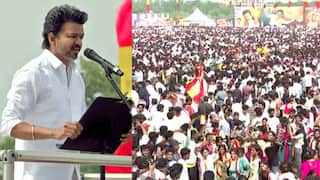Vegetarianism Vs Veganism: What Is The Difference? Know Things To Keep In Mind Before Turning Vegan
Often the terms vegetarianism and veganism are considered synonymous. This article discusses the differences between them and things that one should keep in mind before turning vegan.

It’s no surprise to witness a sudden surge in the rates of individuals switching to a plant-based diet and particularly to a ‘vegan’ way of life. Statistics suggest that turning to a vegan or vegetarian lifestyle is linked to a better quality of life. But, often the terms vegetarianism and veganism are considered synonymous. Of course, they are correlated, as the vegan diet indirectly falls under the different types of vegetarian diets. But wait a minute, have you tried to find the similarities and differences between both? And how exactly do they benefit us?
DIFFERENCE BETWEEN VEGETARIANISM AND VEGANISM?
Avanti Deshpande, who is a PCOS and GUT Health Nutritionist explained what vegetarianism looks like:
"Vegetarianism refers to the exclusion of meat, chicken, fish, and seafood, though sometimes, it could include a few animal-based foods such as milk, dairy products, or even eggs in the diet."
Based on this, vegetarian diets have been categorized into the following as suggested by Avanti:
- A Lacto-Ovo vegetarian diet allows dairy products and eggs in the diet but excludes meat, fish, poultry, etc.
- While a Lacto-vegetarian diet includes milk and dairy products, it does not include meat, poultry, fish, etc.
- An ovo-vegetarian diet primarily includes eggs but restricts other animal foods like meat, chicken, fish, beef, and pork.
- A flexitarian diet flexibly emphasizes more on plant-based foods covering most of their daily diet, but it can occasionally consist of animal foods like meat, poultry, and dairy products.
- A pescatarian diet includes eating fish but excludes other animal foods like meat, poultry, etc.
Talking about veganism, she said, "Veganism refers to a vegan lifestyle that compassionately focuses on the restriction of all animal-based foods and products which are derived from animals or pose a threat to animals’ lives. A vegan lifestyle completely excludes meat, chicken, fish, and seafood as well as milk, eggs, dairy products, and honey. It mainly restricts the products derived from animals."
"While vegetarianism is prevalent for years, veganism has made an impeccable mark lately due to the increasing concerns about animal cruelty and environmental safety. Therefore, veganism has been quite successful in the new age to support animal welfare as well as the impressive health benefits it possesses," she added.
THINGS TO KEEP IN MIND BEFORE TURNING VEGAN:
Dietician Garima Goyal said, "The trend of veganism is on a rise these days, for the safety concern of both animals as well as our environment. Vegan means no eggs or meat or even dairy products. No matter whether you choose to shift to a vegan diet owing to health concerns or ethical reasons, you need to keep in mind certain points."
1. Monitor your Vitamin B12 levels: Our body needs Vitamin B12 for various functions namely DNA synthesis, red blood cell production etc. The main dietary sources of this essential vitamin are non vegetarian foods such as fish, meat, eggs, dairy products etc. So while transitioning to a vegan diet, always monitor your blood vitamin B12 levels and ensure the consumption of these vitamin fortified foods. As far as supplementation of this vitamin is concerned, always take prescription from your doctor.
2. Have rich sources of iron: Iron in the food products we consume is basically of two types - heme and non-heme iron. Heme iron is present in the non vegetarian food items, which makes it more readily absorbable in the body. On the contrary, shifting to a vegan diet makes the diet loaded with non-heme form of iron which is less absorbable by the body. This implies that you need to add more sources of iron rich foods in your diet to meet the body’s demand. This list includes nuts, beans, legumes, green leafy vegetables, iron fortified foods such as salt or breakfast cereals etc.
3. Plan a diet having enough calcium: Again meeting the needs of this macro-mineral is also a concern with veganism. The main dietary source of calcium in the Indian diet is milk and its products. Calcium is crucial for healthy bones and teeth as well as smooth muscular movements. But excluding this food group in the diet should be substituted by other calcium rich foods such as green leafy vegetables, broccoli, calcium fortified foods, non dairy milk such as soy milk, almond milk, oat milk etc., tofu. Consuming both calcium and vitamin D fortified foods will further help as vitamin D raises the absorption of calcium in the blood.
4. Include vegan sources of protein: Protein is the building block of life that is needed for the cellular growth and repair. While an individual is on a vegan diet, no single food can provide all the essential amino acids. So the food you consume should have a couple of sources of protein which will mutually supplement each other and provide all the essential amino acids needed by our body that it cannot synthesise on its own. Vegan proteins sources include beans (kidney beans, black beans etc),lentils, nuts, seeds, tofu, peas etc.
5. Carefully read the food label: Vegan diet demands your full attention especially while consuming packaged foods as they may seem vegan, but no be. For example - If any food’s ingredient list has a mention of casein or whey, it is not vegan as they are derived from milk and its products. Certain breads, granola bars etc. have casein or whey added to them. Likewise, refrain from using products containing gelatine or tallow as they are also animal derived.
ADVANTAGES OF VEGANISM AND VEGETARIANISM:
In this regard, Nutritionist Harleen Gill said, "A diet centred on plenty of whole, minimally processed plant foods lowers your risk of heart disease, hypertension, diabetes, obesity and some forms of cancers and benefits your overall health. Vegetables, fruit, legumes, whole grains, nuts and seeds are low in saturated fat, contain heart-healthy fats and are excellent sources of fibre. They give our bodies vitamins like C and E, dietary fibre, folic acid, potassium, magnesium, minerals and phytochemicals which offer protection against disease."
"People who follow a vegan or vegetarian diet generally have lower blood pressure and LDL cholesterol than non-vegetarians. Studies also show it benefits people to control their blood sugar levels and may reduce inflammation in the body," she added.
DISADVANTAGES OF BEING VEGAN AND VEGETARIAN:
Harleen Gill said, "While vegetarians and vegans eat high amounts of nutrient-rich foods, they may still be at risk of getting insufficient vitamins and minerals such as iron, calcium, zinc, vitamin B12, omega-3 fatty acids and vitamin D. So if you do choose to eat a vegan or vegetarian diet, be mindful that it can take careful planning to get all of the essential nutrients you need especially for pregnant or breastfeeding mothers, infants and young children. Alternative sources of proteins like tofu, legumes, nuts and seeds should be included."
If you choose to say goodbye to animal products here are some ways you can ensure you stay on track as suggested by Harleen.
- Talk to an expert like a registered dietitian or nutritionist to evaluate and identify the right nutritional plan for you.
- Don’t be harsh on yourself, give yourself time to adjust to the new diet.
- Switch ingredients by simply swapping out the main protein with vegetarian sources like tofu. There are various dairy alternatives when it comes to milk and cheese as well.
- Read labels carefully and acquaint yourself with hidden sources of animal products.
"There are plenty of ways to eat for a healthy lifestyle. If you make the switch to a vegan or vegetarian diet it is important to carefully review your eating habits to make sure you are getting proper nutrition. Becoming vegan or vegetarian can be challenging for those with certain medical conditions like anaemia, kidney failure, allergies and malabsorption, IBS and celiac disease and who have gluten intolerance. Always talk to your Nutritionist before planning a switch," she added.
[Disclaimer: The information provided in the article, including treatment suggestions shared by doctors, is intended for general informational purposes only. It is not a substitute for professional medical advice, diagnosis, or treatment. Always seek the advice of your physician or other qualified healthcare provider with any questions you may have regarding a medical condition.]





































